St Cyprian says that we are born with a rope around our necks, and as long as we live on earth we hourly approach the gallows Liguori, Meditation IV
The O’Donohoe Collection contains research notes on John Twiss of Castleisland, who was hanged in Cork County Jail on 9 February 1895 for the murder, on 21 April 1894, of James Donovan, a caretaker of an evicted farm at Glenlara near Newmarket in County Cork.
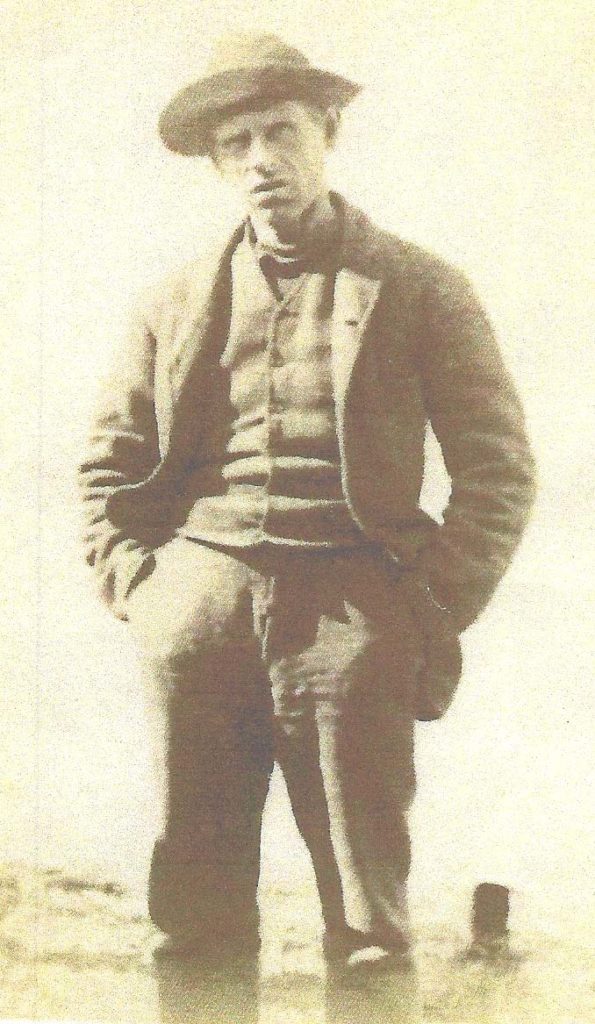
Twiss, who resided with his sister Jane in a cottage at Ardmona, Cordal, was widely believed to have been innocent of the murder. A song, John Twiss of Castleisland, written by Eugene O’Meara of Ardmona, recorded the event:
Farewell my dearest sister Jane, your fond and last adieu, At the early age of thirty-five I now must part from you, For the murder of James Donovan I am now condemned to die On the ninth of February ninety-five upon the scaffold high. John Twiss from Castleisland, it's true it is my name I never did commit a crime, why I should deny that same I own I was a sportsman, with spirit light and gay, But paid spies and informers, my life they swore away.
Following the trial and conviction, which took place in Cork in January 1895, a reprieve campaign was organised and more than forty thousand signatures collected in Ireland and Britain.

Lord Lieutenant, Lord Houghton and Chief Secretary John Morley, however, refused to intervene.
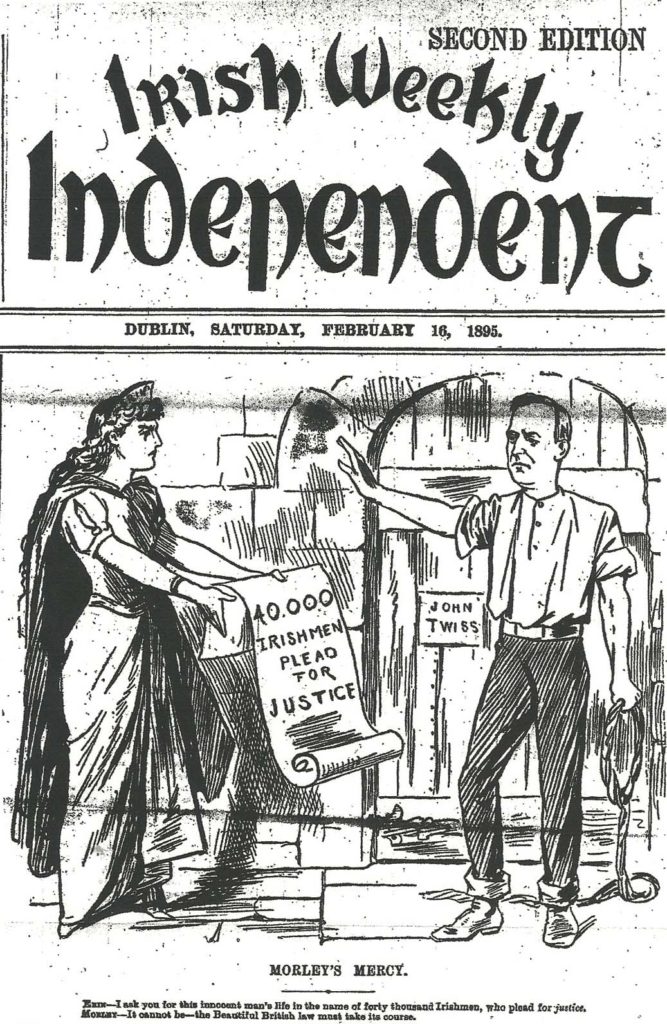
An eight-stanza poem by the O’Connor poets of Kilsarcon records this episode:
When the awful news flashed forth next day Like fire throughout the land, When everyone said to himself, This sentence cannot stand, We'll petition Lord Houten, because we do believe That poor Joe Twiss is innocent, And him we will reprieve.1
The poem also records Twiss’s conduct on receiving his sentence when he spoke ‘for nearly an hour’. His speech from the dock, published in the Kerry Sentinel and Kerry Weekly Reporter (12 January 1895) was composed mainly of questions and illustrated his absolute bewilderment in the face of the proceedings against him.
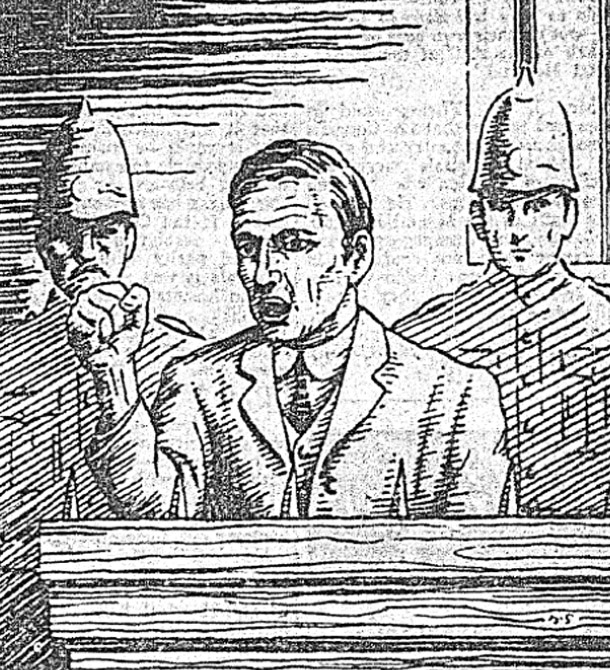
Twiss wondered how the police, without a ‘four-penny bit under their foot unknownst to them’ could have brought such a case, ‘you will never see a man as innocent as I am of the charge’.
Twiss compared his circumstance to that of Poff and Barrett:
Two innocent men hanged here before – Poff and Barrett – and now they have me here hanging me wrongfully, the third man up from Kerry … After the murder and the hanging of Poff and Barrett, it should be an eye-opener to all the juries of Ireland, to take a murder case into larger consideration than five minutes.2
Twiss also alluded to police corruption: ‘It is a frightful thing if I took bribery money and hanged innocent people. Death before dishonour. Hang me before you’ll hang a man.’3
He clasped her hand for the last time
After the trial Twiss’s sister Jane travelled to Cork where she met her brother in the prison in early February 1895. They spoke through the bars and their parting was described as ‘most trying’ to witness. ‘He clasped her hand for the last time … the girl was borne away by the nuns in an almost insensible condition’.
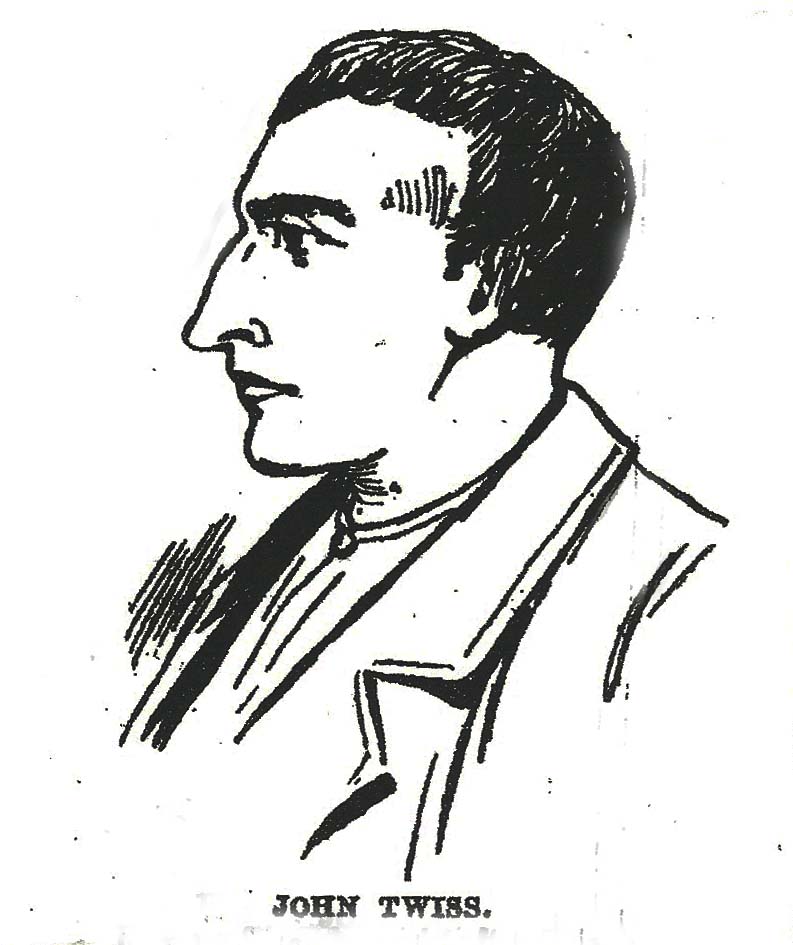
The nuns were the Sisters of Mercy of the Convent of St Marie’s of the Isle who had supported Twiss during his incarceration. Jane also received friendship and support from a stranger:
She had never been much away from home and was quite lost and apparently without a friend. A Mrs M’Namara, wife of a saddler, in Dominick Street and herself a Kerrywoman, hearing of the miserable and solitary condition of the young woman, found out her lodging and insisted that she would accompany her home and stay with her as a guest. Here she has since resided in comparative comfort and amongst friends.4
Jane was described as ‘aged nearly 30, has thin features, refined in expression and now much lined by suffering. She is tall and slender but apparently strong. Her dress was that of Kerry peasant girls, including the characteristic brown shawl with shoulder circle patterns woven into it. Her headdress was her light brown hair’.5
Jane was not among the hundreds who gathered outside Cork prison on the morning of 9 February 1895. At eight o’clock the tolling of a bell and the hoisting of a black flag told that all was over:
At a signal from the Mayor all that vast throng surging outside the prison walls dropped to its knees on the snow and prayers, fervent and long, were offered up for the peace of the troubled soul that had gone.6
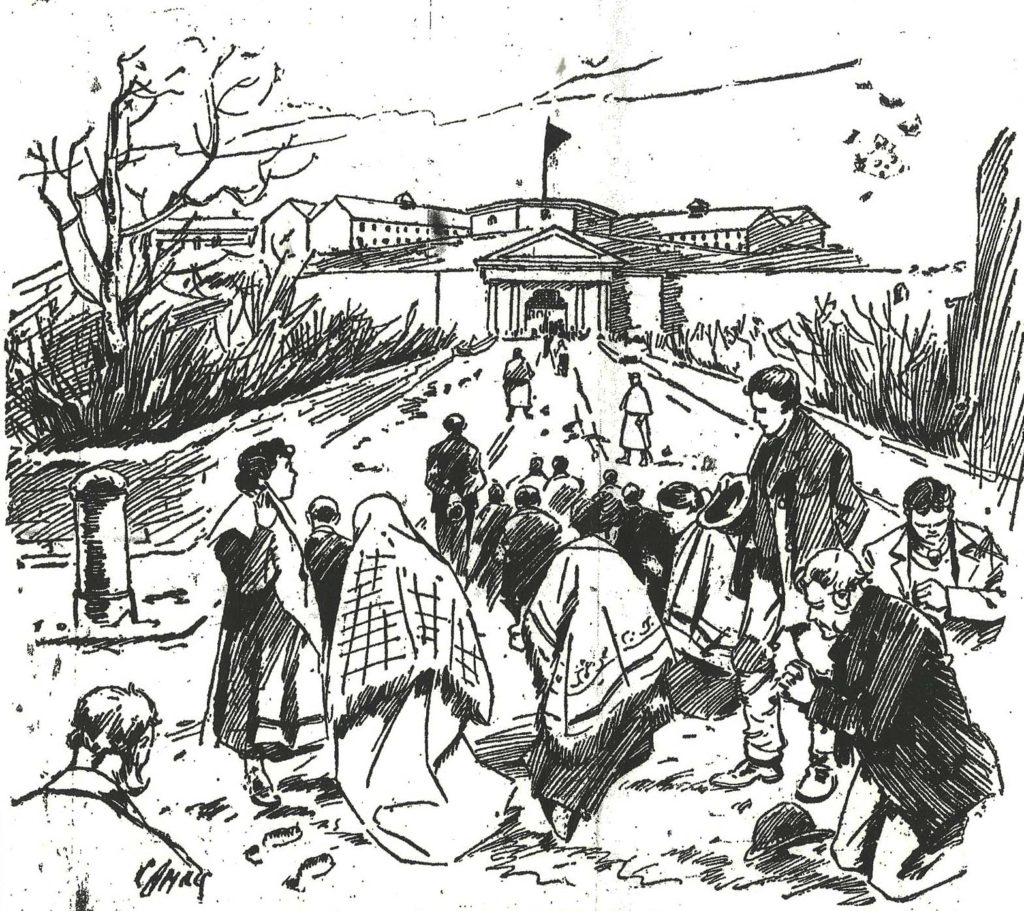
Jane Twiss
In June 1895 Jane was appointed caretaker for Kilmurry and Kilmanihan graveyards, a position which had been held by her brother. She had a son, Denis Cronin (1901-1985) who in a memorial notice revealed his mother did not long survive her brother:
In remembrance of my dear uncle, John Joe Twiss, Ardmona, Cordal, Castleisland, Co Kerry, who was executed in Cork Prison on 9th February 1895 for Moonlighting; also my mother, Jane Twiss, died 18th November 1902, also my father, Michael Cronin, died 20th May 1936. Inserted by Denis Cronin, wife and family.7
A few years after the death of Jane, it was claimed that a man who was shot in Canada during a robbery made a dying confession to the ‘Kilbane murder’ in Limerick (September 1900) and also to participation in the Glenlara murder for which Twiss had been innocently hanged (Kerry Sentinel, 8 March 1905).
The following outlines Twiss ancestry:
Twiss came from among the people yet he was not of the people. He belonged to that fast-disappearing colony of Palatines that, driven by religious stress from Germany and France in the early part of the eighteenth century, were brought over to Ireland by some great landlords … From this Huguenot settlement John Twiss was sprung. He was not wrong when he exclaimed from the dock, ‘I belong to the blood of gentlemen’. His grandfather was William Twiss, a gentleman farmer who lived near Castleisland and was connected by blood with the Herberts and Blennerhassets and other families of high social standing in Kerry.8 His father was Robert Twiss, also a gentleman farmer … He [Robert] married a Cork lady, Miss [Elizabeth] Hely of Donoughmore of the Hely-Hutcheson family. She was a pious Catholic and her early training of the three sons and two daughters of the marriage was responsible for their up-bringing in the Catholic religion. The eldest son, William, became a Catholic Missionary and chose Australia as the sphere of his labours. The decline of the family fortunes was reflected in the neglected training of the two younger brothers, John and George.9 They fell back into the position of labourers.10
A memorial to John Twiss was unveiled by his nephew Denis Cronin at Cordal on 5 August 1984, a year before Denis passed away.11
They Hanged John Twiss, a book by Pat Lynch (not held in the collection) was published in 1982 (a compilation of his earlier articles published in the Kerryman newspaper in the 1950s). A fictional tale of events, I Forgive them All: the Judgement of John Twiss by Paudy Scully was published in 2007 (copy in IE MOD/A20/2 (25)).
Click on the links below to view Michael O’Donohoe’s research notes.
___________
Murder, Mystery and My Family
‘Today we got justice’.
Following publication of this article, ‘They hanged John Twiss’, on the Michael O’Donohoe Memorial Project website on 17 August 2016, the Project Committee was contacted by a production company working on a documentary series for the BBC about historic criminal cases, particularly murder cases which resulted in capital punishment. They wrote, ‘We came across your website and read with interest Michael’s research into the hanging of John Twiss for murder in 1895 … is there anyone working on the Michael O’Donohoe Memorial Heritage Project at the moment that we can speak to about further sources of information about John Twiss’.
The result of that contact culminated in episode ten of Murder Mystery and My Family, a documentary series broadcast on BBC1 at 9.15am over ten consecutive working days from Monday 26 February 2018 to Friday 9 March 2018. The tenth and final episode was about the conviction of John Twiss and included an interview with the O’Donohoe Project Chairman, Johnnie Roche, who spoke about the history of the Moonlighters and land-grabbing.
In the documentary, the case was revisited by two UK criminal barristers, Jeremy Dein QC for the defence and Sasha Wass QC for the prosecution. Two of Twiss’s descendants, great great niece and nephew Helen O’Connor and Denis Sayers, followed the reconstruction and re-examination of the evidence. Jonathan Moore, an expert in Irish history, helped to put the case into historical context.
Helen and Denis visited Kerry County Library where they viewed reports of the trial in old newspapers, ‘In every single article that we’ve read, innocent is the word used every single time’ observed Helen. Helen and Denis also visited the site of Cork prison where Twiss was hanged and buried. Denis said, ‘Hopefully John Twiss can be laid to rest knowing that people still think about him.’ As they paid their respects, Helen added, ‘Hopefully we can bring justice to his name’.
Almost from the outset, the case against Twiss appeared flawed. Jeremy Dein described it as ‘an outstanding example of a situation in which someone tainted by involvement with Moonlighting may have been wrongly convicted of murder because of his reputation’.
Ultimately, counsel on both sides agreed that Twiss’s was an unsafe conviction. Jeremy Dein described the quality of the identification evidence as ‘highly questionable and unreliable’. Sasha Wass conceded that, ‘If the case came before the courts today, the judge would be compelled to stop the case at the conclusion of the prosecution evidence and there would be no case to go to the jury and that would effectively be the end of the matter’.
Senior Crown Court Judge David Radford gave his verdict on the original conviction. He observed that, from the evidence available, the learned judge’s directions to the jury on the identification issues ‘fell short’ and agreed with the learned counsel that the identification evidence was ‘clearly unreliable’. He found that ‘the conviction of Mr Twiss for murder was not properly based on evidence which could lead to a safe conviction.’
Jeremy Dein concluded that the case was ‘incredibly worrying’ and ‘an outstanding example of how dangerous the death penalty is and was’.
Helen and Denis were overwhelmed by the verdict and relieved that at last the voice of the Twiss family had been heard. More than one hundred and twenty years on, they said, ‘Today we got justice’.
____________________
1 The Schools' Collection, Kilsarcon School, Volume 0445, pp 405-410. Kathleen Leahy, Kilsarcon; told by Patrick Leahy, age 66. 'Joe Twiss a protestant lived in a cottage in Cordal ... The local tradesmen refused to work in the erection of a scaffold for his execution and the authorities had to bring men from Dublin to do the work'. 2 See IE MOD/86 for further reference to Poff and Barrett. Deliberation was reported to have lasted less than one hour. 3 'My recollection is that Twiss, before his execution, stated to my friend, Alderman P H Meade of Cork that he could not only have secured his reprieve but his release and a big monetary reward if he would give evidence that would enable the British Government to get one or two of their most powerful and dangerous enemies in Kerry – Maurice Moynihan and Michael Power' (Kerryman, 18 December 1926). A third name, Kennelly, was added to those two at the inquest (Kerry Sentinel, 15 March 1905). Moynihan and Power were described as Fenians; it may have been Maurice Moynihan who composed An Appreciation on the death of Michael Power in 1915, 'He was prosecuted in the Land League days for holding an illegal court and it goes without saying that he was imprisoned under Forsters' Coercion Act. During his incarceration in Limerick gaol one of his children died and it is a melancholy fact that all his family pre-deceased him' (Kerryman, 6 March 1915). Maurice Moynihan died at Ballyard, Tralee in January 1918 in his 52nd year; An Appreciation was published in the Kerryman, 19 January 1918. Further reference, The Moynihan Brothers in Peace and War 1909-1918 (2005) by Dr Deirdre McMahon. 4 Kerry Sentinel, 13 February 1895. A fund to assist Jane Twiss was organised in Cork in March 1895 and £20 was raised. 5 ibid. 6 The Kerry Sentinel, 13 February 1895 & 15 March 1905. Jane remained in the convent with the Sisters of Mercy; the Mayor of Cork was Mr P H Meade, TC, who had worked tirelessly to try to procure commutation of the sentence and from whom Jane learned that a sketch of her brother's face had been made. John Twiss was attended at the gallows by prison chaplain Rev Father Canon P O'Leary. John Twiss's favourite book was The Way of Salvation by St Alphonsus de Liguori, a copy of which he left with his sister. 7 Kerryman, 8 February 1958. Notices also published in subsequent years. 8 William married Catherine Tuite through whom John Twiss inherited the tolls of Currans, Castleisland fair (Flag of Ireland, 16 February 1895). 9 'George Twiss, brother of John Twiss, recently hanged in Cork Jail, was released from Tralee Prison on Sunday on a charge of assaulting a policeman and having a revolver ammunition in his possession ... he states that he was put into prison simply and solely for the purpose of preventing him from procuring evidence on behalf of his brother and showing up the way evidence was manufactured against him. He declares that he had no revolver ammunition when arrested but it was planted on him on the way to the barracks' (Flag of Ireland, 6 April 1895). A report about the Kilbane confession mentioned that 'George Twiss was accidentally killed in New York some time ago' (Kerryman, 6 May 1905). 10 Kerry Sentinel, 15 March 1905. 'John retained a shred of the patrimony but it was confined to the tolls of Curran's Castleisland fairs which he inherited from his mother and which brought him in the sum of £8 a year or thereabouts. He also drew a nominal salary as the caretaker of two small graveyards'. Another press report stated that Twiss was born in London in 1860 and had two brothers, William and George and two sisters, Mary and Jane. William went to Australia, Mary to America and the others stayed in Kerry (Kerryman, 27 April 1935, 'Kerryman hanged for murder in Cork. Full story of arrest and trial of John Twiss'). 11 Denis Cronin of Lower Dromultan, Currow died in Tralee at the home of his daughter Louise on 6 December 1985.


